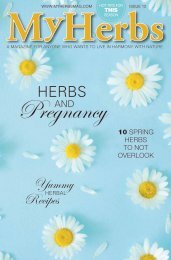My Herbs 1
Find out more on MYHERBS-STORE.COM. My Herbs is a special quarterly publication for anyone who is interested in alternative cooking, home grown herbs, and traditional or complementary medicine or healing methods, simply for everyone who wants to live in harmony with nature.
Find out more on MYHERBS-STORE.COM.
My Herbs is a special quarterly publication for anyone who is interested in alternative cooking, home grown herbs, and traditional or complementary medicine or healing methods, simply for everyone who wants to live in harmony with nature.
Create successful ePaper yourself
Turn your PDF publications into a flip-book with our unique Google optimized e-Paper software.
STRENGTHENING OF MUSCLES<br />
With the treatment of urinary incontinence,<br />
let’s look at some very effective<br />
exercises which were introduced in 1948<br />
by the American gynecologist Arnold<br />
Kegel. Even today they are considered<br />
the first aid of urinary leakage treatment.<br />
They consist of a rhythmic tensing and<br />
subsequent release of the pelvic floor<br />
muscles. Retention time of contractions<br />
varies from one to seven seconds, with<br />
the number of repetitions increased from<br />
80 to 300 times per day.<br />
The entire workout program consists of<br />
four basic stages. The first is where the<br />
woman actually realizes the muscles’ existence.<br />
The second phase involves trying<br />
to disengage belly, thigh, and buttock<br />
muscles. The third focuses on isolated<br />
muscle contractions of the vagina, and<br />
the fourth consists of active usage of the<br />
pelvic floor muscles.<br />
“Before starting physical activities, it<br />
is necessary to visit a specialist doctor,<br />
to determine your incontinence type,<br />
level, and proposed rehabilitation therapy,”<br />
says renowned gynecologist and<br />
obstetrician, Dr. Miroslav Smolik.<br />
Resulting effects after regular exercise<br />
should be felt in around six to eight<br />
weeks. It is worth noting that, by using<br />
this exercise alone, Arnold Kegel helped<br />
cure 84 percent of women with various<br />
types of urinary incontinence. “This form<br />
of treatment can replace demanding surgical<br />
treatment for many patients, or at<br />
least complement it. The exercises can be<br />
applied for prevention, treatment, and<br />
also during the post-operative period,”<br />
says Dr. Smolik, who adds that some<br />
women also take part in exercises strengthening<br />
the pelvic floor muscle courtesy<br />
of East Asian schools, such as Tai Chi or<br />
The Five Tibetan Rites.<br />
“Similar positive effects can be found in<br />
oriental belly dancing, Pilates, yoga and<br />
power yoga, but also hiking, swimming,<br />
cycling, and in-line skating, which, by releasing<br />
stress, help to make you feel absolutely<br />
great.” Exercises to refrain from,<br />
according to Dr. Smolik, include movements<br />
with wide open legs, jumping or<br />
hopping from one foot to the other – basically,<br />
all sports involving jumping, e.g,<br />
ball games, aerobics, gymnastics and<br />
martial arts should be avoided.<br />
UROLOGICAL DISEASES<br />
Frequent urination needs are associated<br />
with the passing of small amounts of<br />
urine on each visit. This symptom may<br />
indicate urinary tract inflammation, renal<br />
colic, or urinary bladder problems.<br />
These frequent urges or pressing need<br />
to urinate occur in the case of reduced<br />
bladder capacity and increased excitability,<br />
such as bladder inflammation or<br />
tumor the urinary bladder. Trouble with<br />
pressing urgency may also go with some<br />
neurological diseases (e.g., multiple sclerosis<br />
or post-spinal injury conditions).<br />
A burning or cutting sensation when<br />
urinating or during its completion is typically<br />
a symptom of inflammatory diseases<br />
of the lower urinary tract. If the urge<br />
to urinate wakes us up during sleep, then<br />
this is a case of nocturia. This may be a<br />
separate disease, but it may also be associated<br />
with neurogenic bladder dysfunction<br />
and may also accompany diabetes,<br />
for example.<br />
Incontinence or bladder weakness is divided<br />
into: stress, urgent and mixed.<br />
Stress incontinence occurs especially<br />
when coughing, laughing, or lifting and<br />
is due to imperfections in the urinary<br />
sphincter, with increasing intra-abdominal<br />
pressure and the simultaneous weakening<br />
of the pelvic floor. The mixed type<br />
of incontinence shows a concurrence of<br />
conditions leading to urgent and stress<br />
incontinence.<br />
For<br />
Women<br />
MYHERBSMAG.COM<br />
77












